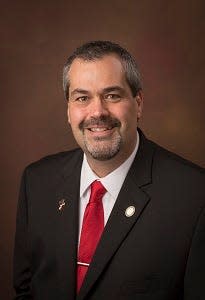Consequences from Medicaid expansion in other states should serve as warning for Kansas

From pickle jars to GoFundMe’s, there are plenty of stories floating around about the false narrative detailing the "benefits" of Kansas Medicaid expansion.
These stories mislead Kansans on the realities of Medicaid expansion at best, and at worst, ignore — willfully or not — how harmful expansion would be for the vulnerable people who rely on the program to meet their health care challenges.
Other states’ experiences clearly indicate that the stories of Medicaid expansion are not heartwarming or encouraging — rather, they are a bellwether with an ominous warning. One need only examine the true outcomes of Medicaid expansion in other states to understand what Kansans could expect should this disastrous policy come to pass.
Medicaid expansion would not resolve a coverage gap — it would kick Kansans off private health insurance. Currently, many low-income Kansans living between 100 to 150% of the federal poverty level are eligible for silver-level private insurance plans through the Health Care Exchange marketplace at no cost with federal subsidies.
Expanding Medicaid would strip these individuals of their private, higher-quality insurance and force them into a dependency-focused welfare program with lower-quality care that is accepted by fewer providers.
This isn’t hypothetical — this is a confirmed consequence of expanding Medicaid to able-bodied populations. At the onset of Montana’s expansion of Medicaid, more than 17,000 individuals living within 100% to 150% of the FPL were enrolled in private health exchange plans. Within three years, that number dropped by 72%.
Thousands of Montanans were forced off their higher-quality plans and onto inferior coverage. Should Kansas expand Medicaid, we can expect the same devastating result.
Expansion would not increase access for those with disabilities. In fact, it would leave fewer resources for our most vulnerable citizens. Expansion simply opens enrollment to able-bodied populations. There is no “expansion” of care or access for traditional populations like pregnant women, seniors, and kids in foster care. Rather, the same resources are more thinly spread over ever-increasing welfare rolls, leaving fewer resources for those who need them most.
Routinely, in states that have expanded Medicaid, cost and enrollment projections have shattered estimates. Arkansas enrolled 51% more people than expected. Kentucky blew past their estimation by more than 134%. And in Colorado, enrollment was 139% higher than initially projected.
These shockingly high enrollments mean higher program costs — nearly three dozen states spend more than one full quarter of their budgets on Medicaid. Inevitably, this leaves less room for other priorities like education and public safety.
Worst of all, it means Medicaid patients wait longer to receive the care they need. When state programs reach capacity, individuals living with chronic debilitating conditions languish on waiting lists — thousands of individuals have already died while waiting on Medicaid to approve their pleas for care.
Allowing able-bodied adults to enroll will only make their desperate situations worse. And the inevitable reduction in access to providers will only add insult to injury.
Hospital jobs are not created by Medicaid expansion and expanding Medicaid would not protect rural communities. It would put them at even greater economic risk. For example, Arkansas hospitals lost more than 700 jobs in the first year of expansion. In Iowa, hospitals lost more than 1,000 jobs within the first year.
Hospitals — especially rural ones — are in danger of being permanently shuttered. Putting more Kansans on a program with reimbursement rates two-thirds lower than private insurance is not the solution. Expansion means budget cuts, layoffs and eventually, closure of hospitals.
If Kansas lawmakers are expecting job creation and financially secure hospitals, they will be sorely disappointed when the bills come due. The experiences of other states show us that expanding Medicaid is not the silver bullet it is touted to be.
States that have expanded Medicaid and are bearing the consequences have learned the hard lessons of Medicaid for us — we should learn from their experience and not repeat their mistakes.
The true story of Medicaid expansion should serve as a warning — that with it, we can expect to force thousands of able-bodied adults into government dependency at the expense of the truly needy.
We in the Legislature will continue to sound the siren and oppose Medicaid expansion — because doing so is in the best interest of those we have been trusted to represent well.
Sen. Richard Hilderbrand represents Kansas’s 13th District in the State Senate and serves as the chairman of the Kansas Senate Committee on Public Health and Welfare.
This article originally appeared on Topeka Capital-Journal: Kansas can learn from consequences of states that expanded Medicaid
